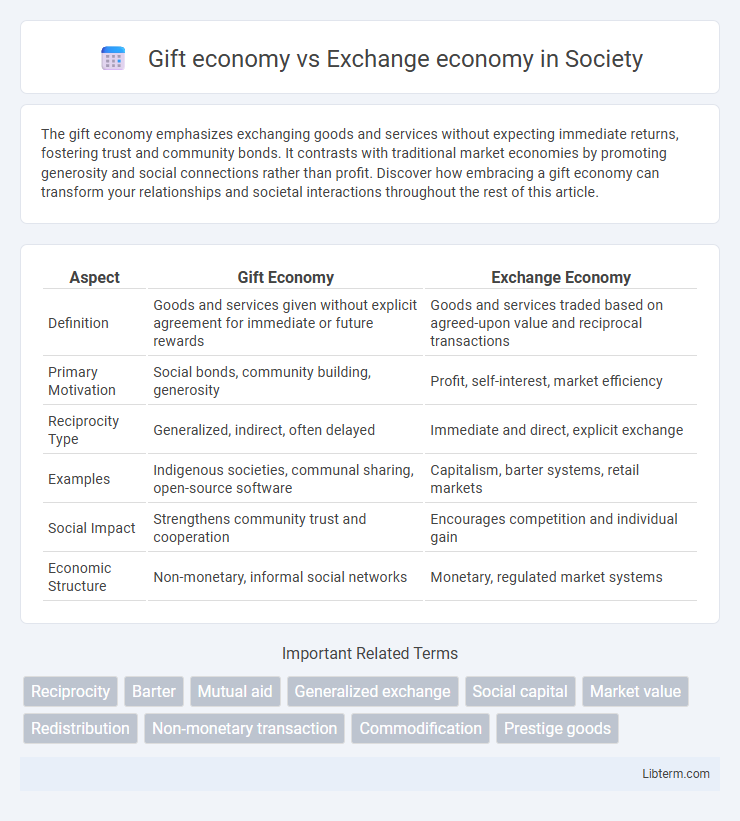The gift economy emphasizes exchanging goods and services without expecting immediate returns, fostering trust and community bonds. It contrasts with traditional market economies by promoting generosity and social connections rather than profit. Discover how embracing a gift economy can transform your relationships and societal interactions throughout the rest of this article.
Table of Comparison
| Aspect | Gift Economy | Exchange Economy |
|---|---|---|
| Definition | Goods and services given without explicit agreement for immediate or future rewards | Goods and services traded based on agreed-upon value and reciprocal transactions |
| Primary Motivation | Social bonds, community building, generosity | Profit, self-interest, market efficiency |
| Reciprocity Type | Generalized, indirect, often delayed | Immediate and direct, explicit exchange |
| Examples | Indigenous societies, communal sharing, open-source software | Capitalism, barter systems, retail markets |
| Social Impact | Strengthens community trust and cooperation | Encourages competition and individual gain |
| Economic Structure | Non-monetary, informal social networks | Monetary, regulated market systems |
Understanding Gift Economy: Definition and Principles
Gift economy operates on the principle of voluntary giving without an explicit agreement for immediate or future returns, fostering social bonds and community trust. It contrasts with exchange economy, where transactions involve a defined value and reciprocal exchange, typically through money or barter. In a gift economy, value is derived from relationships and generosity rather than quantifiable economic metrics.
What is an Exchange Economy? Key Characteristics
An exchange economy is a system where goods and services are traded between individuals or groups, typically using money as a medium of exchange. Key characteristics include the presence of market mechanisms, price determination based on supply and demand, and voluntary transactions aimed at mutual benefit. Unlike a gift economy, where transfers are based on social relationships and reciprocity without explicit expectations of return, an exchange economy emphasizes contractual agreements and economic efficiency.
Historical Roots: Origins of Gift and Exchange Economies
Gift economies trace back to prehistoric societies where communal sharing and reciprocity ensured group survival, exemplified by indigenous cultures such as the Pacific Northwest tribes practicing potlatch ceremonies. Exchange economies emerged with the rise of agriculture and urbanization around 10,000 years ago, facilitating surplus production and the development of trade networks in Mesopotamia and the Indus Valley. These historical roots highlight a transition from social cohesion through gifting to market-based transactions driven by economic specialization and commodity exchange.
Social Relationships in Gift vs Exchange Economies
In gift economies, social relationships are strengthened through the continuous cycle of giving and reciprocation, fostering trust and communal bonding without immediate or equivalent returns. Exchange economies emphasize transactional interactions where social ties are often secondary to the value of goods or services traded, prioritizing economic efficiency and individual gain. The gift economy's relational focus promotes long-term social cohesion, while exchange economies facilitate market-driven connections based on explicit contracts and agreements.
Trust, Reciprocity, and Community Building
Trust is fundamental in a gift economy, where exchanges rely on mutual goodwill without immediate or equivalent returns, fostering deeper social bonds. Reciprocity in gift economies is often indirect and long-term, reinforcing community cohesion rather than transactional balance typical in exchange economies. Community building thrives in gift economies by emphasizing shared values and collective responsibility, contrasting with the individualistic, contract-based interactions characteristic of exchange economies.
Value Creation: Altruism vs Self-Interest
Gift economies create value through altruism, where individuals offer goods or services without expecting immediate returns, fostering social bonds and communal trust. Exchange economies generate value based on self-interest, emphasizing reciprocal transactions that maximize individual benefit and market efficiency. The contrast lies in motivation: gift economies prioritize collective well-being, while exchange economies focus on personal gain and economic optimization.
Efficiency and Allocation of Resources
Gift economies foster efficiency by relying on social relationships and reciprocity, reducing transactional costs and promoting resource sharing without immediate returns. Exchange economies optimize resource allocation through market mechanisms and price signals, enabling direct incentives for production and consumption decisions. While gift economies emphasize long-term social cohesion, exchange economies prioritize short-term economic efficiency and precise distribution of goods and services.
Challenges and Limitations of Gift Economies
Gift economies face significant challenges such as the difficulty in maintaining fairness because contributions and reciprocations are informal and lack explicit valuation, leading to potential exploitation or imbalance. Social cohesion is crucial; without strong community ties and trust, the system can break down due to free-riding or lack of motivation to give. Scalability is another limitation, as gift economies function optimally in small, close-knit groups but struggle to sustain large, complex societies where tracking and reciprocating gifts becomes impractical.
Modern Examples: Gift and Exchange Economies in Practice
In modern contexts, gift economies thrive in open-source communities where contributors share software code without direct compensation, fostering collaboration and innovation. Exchange economies dominate traditional marketplaces and e-commerce platforms like Amazon, where goods and services are traded for money based on set prices and contracts. Hybrid models emerge in platforms like Patreon, where users give voluntary financial support, blending gift-giving with monetary exchange elements.
Future Perspectives: Blending Gift and Exchange Economies
Future economic models increasingly integrate gift economy principles with traditional exchange systems, leveraging blockchain technology to enhance trust and transparency. Hybrid approaches promote community resilience and social capital by combining altruistic sharing with market-driven incentives, enabling sustainable resource distribution. Emerging platforms facilitate peer-to-peer collaboration that balances reciprocity and innovation, creating adaptive economies for evolving digital and physical marketplaces.
Gift economy Infographic

 libterm.com
libterm.com